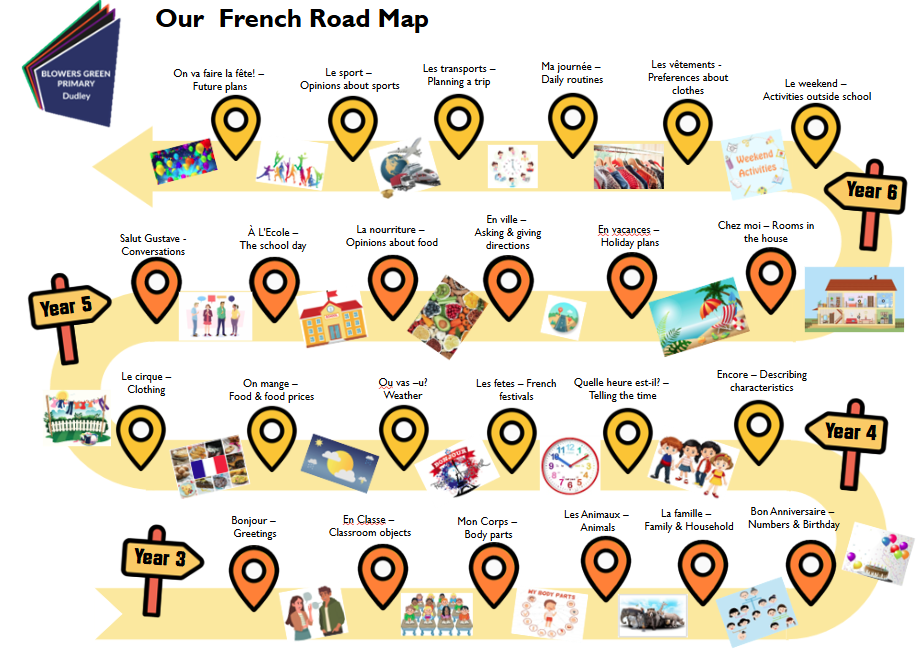Modern Foreign Languages - French
Learning a language in primary school lays a strong foundation for language development, enhances cognitive skills, and fosters cultural awareness from an early age.
"A language is not just words. It’s a culture, a tradition, a unification of a community, a whole history that creates what a community is. It’s all embodied in a language."
~ Noam Chomsky

Intent - What does the French curriculum intend to do?
At Blowers Green, our French curriculum is designed to inspire a love for languages, foster cultural awareness, and equip pupils with the confidence to communicate in French. We believe that learning a foreign language broadens horizons, encourages curiosity about French and Francophone cultures, and prepares children for a globalised world. Through French, we aim to enhance communication skills, build resilience, and deepen students’ appreciation of diverse cultures. Our curriculum ensures that all pupils develop a strong foundation in French, preparing them to embrace new languages and cultures in the future.
We aim to equip pupils with the skills and knowledge needed for further study in Key Stage 3 by developing transferable linguistic abilities, such as vocabulary acquisition, grammatical understanding, reading strategies, and phonology. Pupils will gain confidence in communicating clearly and accurately in both speaking and writing, expressing opinions and engaging in conversations on familiar topics. Additionally, we encourage an appreciation of French songs, rhymes, stories, and games to enrich their cultural and linguistic experience.

Implementation – How is the French curriculum implemented?
In Key Stage Two, French lessons are timetabled weekly and team-taught by each class teacher alongside a specialist language teacher from Dudley Academies Trust. These lessons support the development of speaking, listening, reading, and writing skills.
French is taught through a well-sequenced curriculum that builds on prior knowledge. Each new unit begins with a recap of related knowledge from previous years, ensuring that pupils retrieve and reinforce what they have already learned. This approach helps to interrupt the forgetting curve and ensures that new knowledge is taught in the context of prior learning, allowing for better retention and a shift to long-term memory. By focusing on depth rather than breadth, we aim to ensure pupils know more and remember more over time.
Lessons emphasise vocabulary, pronunciation, and grammar in an engaging and accessible way. Oral communication is central to our approach, with pupils regularly practicing speaking through role-play, songs, rhymes, and interactive conversations. These activities help to build fluency and confidence. As pupils progress, they move from recognising simple words and phrases to constructing full sentences. Writing activities reinforce French grammar and spelling, while key vocabulary and grammar structures are revisited frequently to ensure learning is embedded.
In addition to language skills, pupils develop cultural awareness by learning about traditions, customs, and lifestyles in France and other French-speaking countries. Events such as European Day of Languages, Bastille Day and April Fools' Day (poisson d’avril) and cultural themed days provide memorable opportunities to experience French culture through food, music, and art.
Through this structured approach, we ensure that pupils at Blowers Green develop a love for language learning, build essential communication skills, and gain a deeper understanding of the world around them. As practice makes permanent, our curriculum fosters long-term retention and prepares pupils for continued success in language learning.
Impact – What progress will children make?
At Blowers Green, the impact of our primary French curriculum is assessed through engaging and well-structured lessons that enable children to make clear progress in their ability to communicate in French. Assessment becomes a conversational routine, with teachers and our specialist language teacher regularly discussing pupils’ progress, providing feedback, and encouraging self-reflection to support continuous improvement. This ongoing dialogue helps pupils develop confidence in their language skills, ensuring they are well-prepared for further language study in high school and beyond. Through speaking, listening, reading, and writing activities, teachers monitor pupils’ growth in vocabulary, pronunciation, grammar, and fluency, fostering long-term retention and proficiency.
By embedding confidence in and a love for French from an early age, we ensure that all children at Blowers Green are equipped with valuable language skills and an appreciation of the wider world.
By the time pupils leave Blowers Green, they will have:
-
Developed confident communication skills – Pupils will be able to listen, speak, read, and write in French with increasing fluency and accuracy, using key vocabulary and sentence structures effectively.
-
Built a strong foundation in language learning – Children will have a solid understanding of basic French grammar, pronunciation, and common phrases, enabling them to form simple sentences and hold short conversations.
-
Gained cultural awareness and appreciation – Pupils will have explored the traditions, customs, and daily life of French-speaking countries, fostering respect for global diversity and an interest in other cultures.
-
Improved listening and pronunciation skills – Through regular practice, pupils will develop confidence in understanding and responding to spoken French, helping them to communicate more naturally.
-
Increased enthusiasm for language learning – Our engaging and interactive approach ensures that children develop a positive attitude towards learning languages, inspiring them to continue studying French or other languages in the future.
-
Prepared for high school and beyond – Pupils will leave with the foundational skills and confidence to transition smoothly into Key Stage 3 language learning, equipped with strategies to support further language acquisition.
Aims of the French Curriculum
The national curriculum for languages aims to ensure that all pupils:
-
understand and respond to spoken and written language from a variety of authentic sources
-
speak with increasing confidence, fluency and spontaneity, finding ways of communicating what they want to say, including through discussion and asking
questions, and continually improving the accuracy of their pronunciation and intonation
-
can write at varying length, for different purposes and audiences, using the variety of grammatical structures that they have learnt
-
discover and develop an appreciation of a range of writing in the language studied.